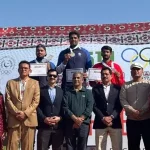A Saudi-Palestinian company has created a solar-powered umbrella to help meet the demands of Muslim pilgrims.
“Knowledge-Base” hopes its invention will go world-wide and reach multiple users who can take advantage of the solar-powered, GPS savvy accessory.
The multi-purpose umbrella transforms sunlight into electricity, which can then be used to generate power for the umbrella’s many features.
The smart umbrella ‘Kafya’ was born in the Kingdom’s holy city of Mecca, the brainchild of Saudi Arabian scientist Kamel Badawi.
Badawi has volunteered to help facilitate Muslim pilgrimage since he was just a boy. During his years of service, he began to understand through the first-hand experience what pilgrims need the most, and thus the smart umbrella was born.
With the help of his Palestinian partner, Manal Dandis, the two set off to create a product they hope will add value not only to the experiences of Muslims in the annual hajj season but also to people around the world.
“Umbrellas are always in demand, especially in Europe. They are also being used in hajj. However, the pilgrims only use the umbrella as a form of protection from the sun. No one has considered the umbrella could be used for more than one purpose. When we started thinking about this, we found that we could install a built-in fan to keep the user cool.
This is a great idea when you consider that the next twelve years will be extremely hot for pilgrims. Of course, this claim concerning the extremely hot weather is based on a study we conducted. The built-in electric charger and GPS system are both powered by solar energy.
This means we always have electricity to not only charge mobile phones but computers as well. You can charge any device that can be connected via USB. The GPS system will help families stay together by helping each individual who has an umbrella easily identify where he or she is,” Badawi said.
Some of the features include a GPS system, a built-in fan and flashlight.
The umbrella also comes with three different USB outlets to charge mobile phones, tablets and other portable devices including laptops.
“Of course, the GPS system comes with a mobile application that you can download and the pilgrim can verify his/her umbrella on this application, in turn making it much easier for pilgrims to communicate with one another,” Dandis said.
Since the idea was conceptualised last year, both Badawi and Dandis’ focus has been on designing a prototype for copyright purposes.
“Getting the patent for the product was the first step. The second step was to start marketing it. Marketing needs special supervision, so we had to find a company capable of providing this supervision.
In order for our product to spread worldwide, we have to avoid marketing it as an exclusive hajj product,” Badawi said.
Badawi and Dandis hope an international company or government body will invest in their product to begin mass production. They hope to make it available at an affordable price for anyone to buy.





